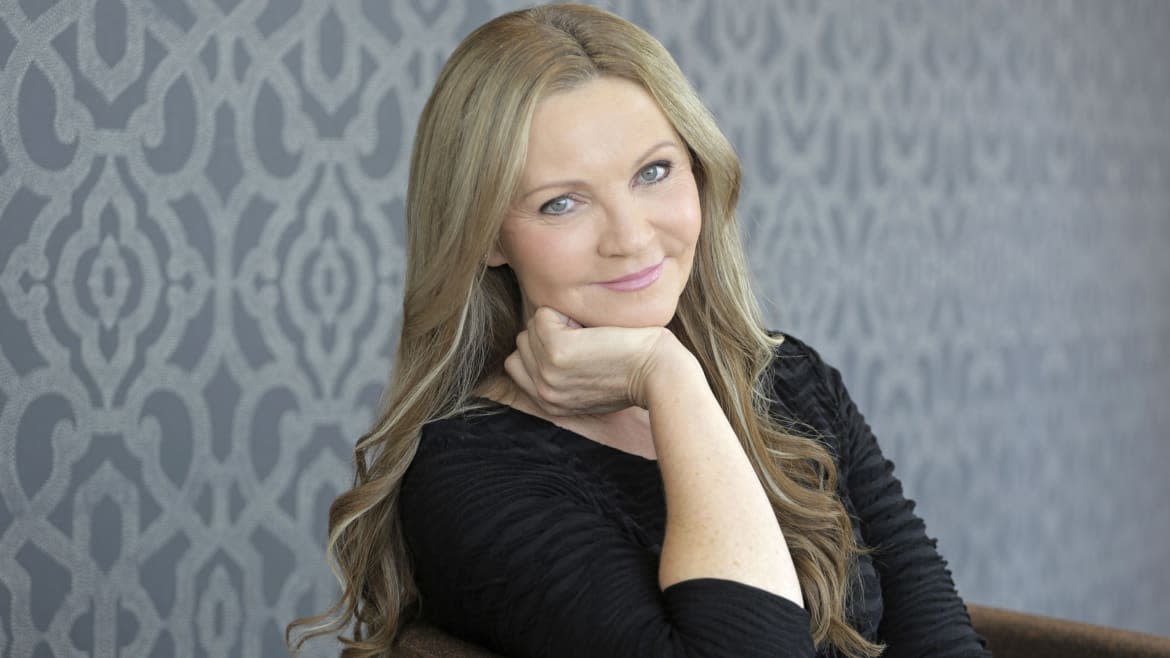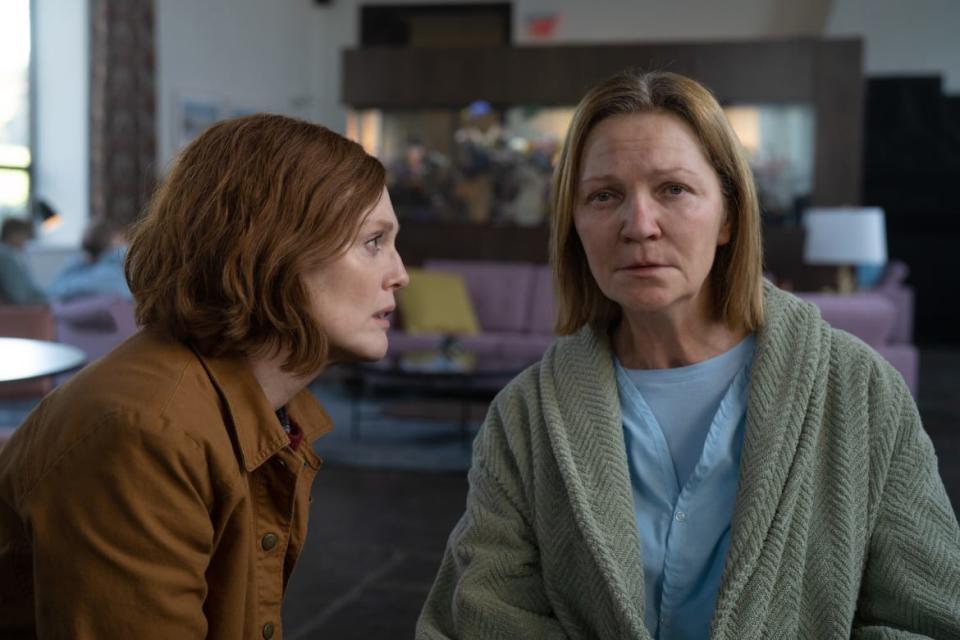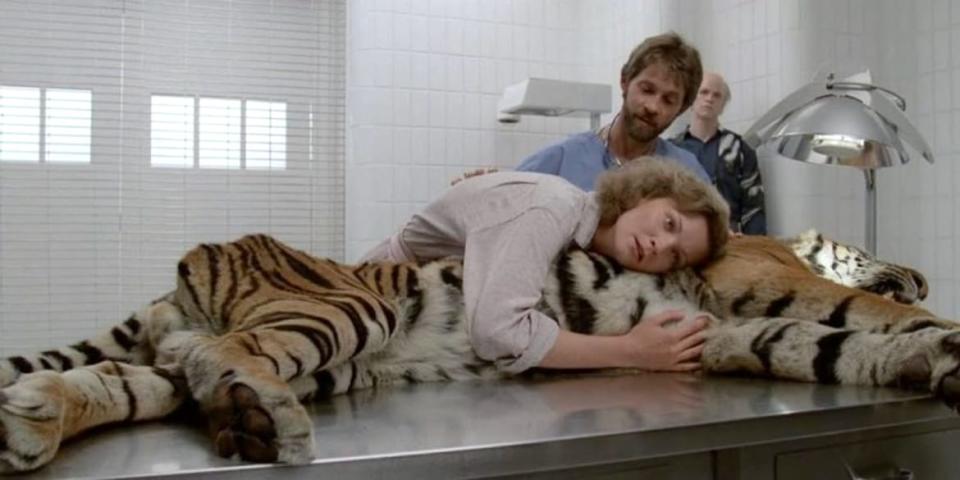Joan Allen on Weathering the Pandemic With Her Little Chipmunk

“The older I get, the harder I think it is to act,” says Joan Allen.
The three-time Oscar nominee and Tony Award winner is expounding on the high she gets whilst performing on stage—an “endlessly engaging” experience she’s been missing over the past year-plus that Broadway’s lights have been dark.
In the meantime, the 64-year-old acting great has been at her home in Connecticut with a certain furry-tailed companion—a squirrel, that is, who emerges every afternoon around 3 p.m., sprints five inches from her, dives into a bush, gathers berries, and brings them back.
“I was just sitting on my back patio, staring out and waiting for something to happen, watching my little chipmunk run back and forth,” she says of the pandemic. “I called him ‘my little chipmunk.’ He was my pandemic buddy.”
While Allen cut her teeth in the theater, training at the Steppenwolf Theatre Company before wowing Broadway, for ’90s kids like myself, Allen was everywhere. From 1995-2000, she starred in Nixon, The Crucible, The Ice Storm, Face/Off, Pleasantville, and The Contender, often as a woman yearning to free herself from the shackles of an unhappy marriage. Through Allen’s tender turns, women ground down by domesticity were taught that it’s OK to want something more, and to prioritize their happiness.
Stephen King on Scary Stalkers, Being ‘Canceled’ by J.K. Rowling, and Navigating Trauma
Lisey’s Story, however, is unlike any Allen performance you’ve seen before. She plays Amanda, the troubled sister of Lisey (Julianne Moore), who is prone to psychosis, hallucinations, and self-harm. She serves as a portal of sorts to an alternate dimension—one Lisey is navigating to discover who killed her author-husband Scott (Clive Owen), and why. The series is directed by Pablo Larraín (Jackie), produced by J.J. Abrams, and scripted entirely by the source material’s author Stephen King, making it the most star-studded Apple TV+ project to date.
The Daily Beast spoke with Allen about the pandemic, her new show, and her greatest hits.
You came up in the theater, and I imagine doing a character like Amanda on stage would prove quite difficult, occupying that headspace every night for a hundred nights.
Yes, and there is an advantage to film. I remember when I did The Crucible, I had never read the play when I did the film, and there’s this very emotional scene where Elizabeth Proctor lies, and it’s this huge climax because she never lies, and I was thinking, “I’m so glad this is film, and I don’t have to do this eight times a week!”
Speaking of The Crucible, I’d read that Daniel Day-Lewis did not bathe or shower during the entire shoot to stay in character. Is that true?
I have no idea! I did not notice that, but I know he did go early to Salem in order to help build the village. I can’t vouch for the bathing thing.
Yes, I’d also read that he built the Proctor home that we see in the film.
Yes, that’s true.
Incredible. To go back to Lisey’s Story, this is a very challenging character. What drew you to her? I was drawn to her because a lot of characters I play are more contained, I would say, and the strength and the balance for a husband-family crisis, and this character was so unwell. She can’t take care of anyone, and everyone has to take care of her. It was liberating to play a character like that. It was very fun to play the unstable person this time. I found it refreshing.
There are these beautiful scenes in the show where you’re in an alternate dimension. Was that a set?
It was a set, primarily. It was amazing. It was built on a stage in Brooklyn at Steiner Studios, and it was huge. It was a long shoot. It started October 2019, and it was supposed to go into April of 2020, and of course we got interrupted—like every other production—in March. We were about to shoot that sequence by the pool, and they’d built this huge amphitheater, there’s a waterfall, and there’s a million-gallon pool. We were supposed to start shooting there on Friday, March 13, and I got a call we were shutting down. When we started again in September, that was the set that I worked on, and I was there for four days. It was surprisingly kind of easy to get back into. Pablo Larraín is such a wonderful director, and the COVID precautions were extremely good on our production. There was extreme testing, as well as lanes you could go in, and the set itself was so big that it almost lent itself to COVID, because you could be very spaced out.
The pandemic’s been such a crazy time. Have you taken up any new hobbies during it? I’ve certainly cooked more than I ever have.
Cooking definitely came to the forefront, because I was an eating out four times a week or ordering in-type of person, and I thought, “Uh-oh, that will not be happening.” It’s not like I’d never cooked, but I got into a phase where I wasn’t doing very much, so that definitely picked up. And now, I’m at a point where I don’t even know if I want to go out. I’ve been to a few outdoor dining situations and I’m vaccinated, but it’s a slow re-entry. Years ago, before my daughter was born—and she’s 27 now—I did needlepoint, and I picked that up again and I made some pillows for some loved ones. That was nice.
As far as cooking goes, what’s the Joan Allen specialty?
Oh my gosh! A lot of roasted vegetables. Tonight, for instance, I’m making halibut with some garlic, lemon, and some spices on top. Very simple and clean. And I’m roasting asparagus and some tomatoes. A lot of roasted vegetables with chicken or fish, a nice turkey burger, and a really good tofu stir fry. Oh! And homemade pizzas! Getting these thin crusts and getting the ingredients yourselves.

Julianne Moore and Joan Allen in Lisey's Story
Lisey’s Story also deals with the toll of celebrity, and I’m curious how you’ve managed to hold on to your private life and keep it separate.
It really hasn’t been that difficult for me. I’ve had certain films come out where there might be a little flurry of recognizability—the Bourne films, for example, and The Notebook—but those things wane a little bit. I think the people who are even more recognizable are the ones who are on television regularly, because people sit with them in their homes every night. I haven’t had much of a struggle with that, and I’ve chosen to keep my life as simple, private, and low-key as I can. I don’t attend a lot of events and have a small circle of friends and family members and choose to spend my time with them.
I know you’re usually in New York City in non-pandemic times, so I’m curious what some of your favorite spots are in the city.
Well, I’m officially not a New Yorker as of about a year ago. I had a home in Connecticut for about five years, and I’d sold my two-bedroom on the Upper West Side, and then I’d rented a studio in Midtown about two weeks before the pandemic shutdown, just so I’d have a place in the city, and then I gave up the studio apartment about a month ago. But I’m an Upper West Side gal, and I absolutely love Riverside Park.
Oh, I spent some of my early years on the Upper West Side. RIP H&H Bagels.
Oh man! Yeah! That was a huge loss.
My family always used to go to The Cottage, that Chinese restaurant on Amsterdam that gave you the free wine.
That is crazy! That was my daughter’s favorite Chinese, and she was heartbroken when that closed. My other favorite spot is Murray’s Sturgeon Shop, which was still there when I first moved to New York City in 1983.
You grew up in Rochelle, Illinois, a tiny town with under 10,000 people, and I read that your mother was a homemaker, and your father ran a gas station. Hollywood must have seemed a million miles away. How did acting enter the picture for you?
I got really interested in high school. I probably even knew when I was younger, probably seven or eight, because I would pretend things. I took ballet lessons, and then I was a cheerleader in middle school, which was a form of performance, but I started doing plays in high school and thought, “Oh, this is it. This is fun.”
Did you view acting as a form of escape?
For me, it was liberating as a way of expression. I was more introverted by nature, and there were these emotional landscapes to explore that was freeing in the safety of a play. You can scream and yell, and there aren’t any consequences for you personally, and then people can clap for you at the end if you’ve done your job! [Laughs]
And you met John Malkovich in college. I have to ask: What was John Malkovich like in college?
Very florid! And very exotic to me. He was in puffy white shirts and purple platform shoes. It was definitely very exotic to me.
That is amazing. I read that he’d helped push you to pursue acting.
Oh, he was so helpful. He was a couple of years older than me, and we only spent one year together at Eastern Illinois University before he left his senior year and went to Illinois State University, which was where Steppenwolf Theatre Company started. They invited John to join, and I stayed in touch with John and visited him there. One of their actresses decided that she wanted to become a dancer, so John suggested me, and I went to do a play with them and then got asked to join the company permanently. It really is through my relationship with John that I was invited into the company, and I’m ever grateful for that.

Joan Allen in Manhunter
One of your earliest films was Peggy Sue Got Married, and I’ve heard so many fun stories about that film, including that Nicolas Cage surprised even his uncle with that voice.
I vaguely remember that! It was a very early movie for me, and I was pretty nervous on a film set because I’d done theater for years and didn’t understand the language—the stopping-and-starting, and people touching your face right before you say action and you have to have an emotion. I was like, what? So, I was a little in my own bubble and watching to see how you do it.
It really was a trial by fire because your second-ever film was Manhunter, and in that film you have a scene with a tiger.
Oh, I thought it was great! I was like, who gets the chance to do this? And the vet that was in the scene was also the handler/trainer of the tiger. He was right there with me and I was like, “He’s really out, right?” I got to put my hand in its mouth and feel its teeth and its tongue, its fur and its paws. I was pretty trusting that if the trainer was in the space with me, things would probably be OK. Although the camera crew were all behind chain-link fences.
One film I feel obligated to ask you about because I love it so, so much is Face/Off. It holds up so well because it’s so wild. And you really are the eye of the storm in that movie balancing out these two batshit-insane performances.
I know! But I was only acting with one of them at a time—mostly with John—and I was more of the domestic storyline. I loved John Woo so much, the director. He was fantastic. I’m sort of the talky part of the story in the midst of all these stunts and pyrotechnic action sequences, but [Woo] took my part of the story very seriously, and I was very moved by that. I remember at one point I was asking, “I’m supposed to cross the room. Would it help camera if I tweak it and ‘banana’—which is to take a curve instead of walk [straight]—and John Woo just said, “Joan, the camera moves for you, you don’t move for the camera.”
‘Face/Off’ At 20: All Hail the Most Gleefully Batsh*t Action Movie Ever
For Nixon, is it true that you tested with Warren Beatty who suggested you for the role?
I didn’t test with him, but I’d had an evening with him and Oliver Stone. I’d had my daughter, I was in New York, and I hadn’t worked in 14 or 15 months because I wanted to stay home with her. I got a call from my agent saying, “They want to fly you to Los Angeles. Oliver Stone is going to do this movie… it may be Nixon and they might be looking at you for Pat Nixon… and they want you to meet with somebody… and it might be Warren Beatty or Jack Nicholson.” I got the script, read it on the plane, and was taken to Oliver’s office, and spent an evening listening to Warren Beatty and Oliver Stone. I did a lot of listening. I have this memory of Warren Beatty having an incredible capacity for remembering people’s phone numbers. His mind was like a rolodex.
That would explain all the women he’s been with. He remembered all their numbers.
[Laughs]
You’re a three-time Oscar nominee, you’ve been in like a dozen wonderful films—from The Ice Storm and Pleasantville, to Face/Off and Manhunter, to Searching for Bobby Fischer and the Bourne movies—and you’re now starring in a big TV series, so I’m curious if there’s anything more you’d really like to check off your acting bucket list?
I don’t, really. No. If something comes along that is interesting to me, I’ll certainly jump at it though. For sure.
Got a tip? Send it to The Daily Beast here
Get our top stories in your inbox every day. Sign up now!
Daily Beast Membership: Beast Inside goes deeper on the stories that matter to you. Learn more.

 Yahoo News
Yahoo News 
